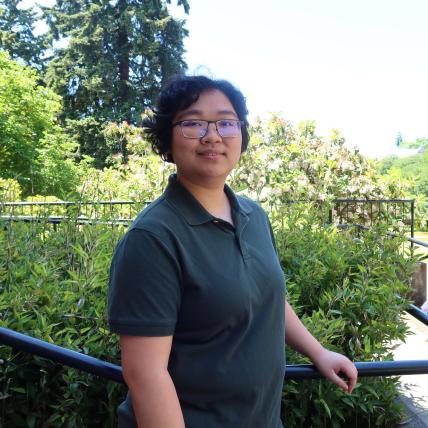School of Music graduate Olivia Wang has been named a 2023-24 recipient of the University of Washington College of Arts and Sciences Dean’s Medal, a distinction awarded to the top graduating senior of each division of the College.
“This is one of the most distinguished honors we bestow, and I’m very pleased to commend you on your amazing record of academic achievement,” wrote Arts and Sciences Dean Dianne Harris in her commendation letter to Wang.
Along with making exceptional progress in her coursework while earning a B.S. in Computer Science and B.A. in Music Theory, Wang integrated her studies into compelling interdisciplinary research and devoted time and energy to volunteer service benefiting the entire School of Music community. She also participated in numerous ensembles on various instruments— piano, violin, percussion, and voice—and even dabbled in conducting for a recent Symphonic Band performance.
Since entering the UW as a freshman in 2020, Wang performed in Percussion Ensemble, UW Symphony Orchestra, Campus Philharmonia Orchestra, performed in chamber music groups, sung in Recital Choir, and served as a piano accompanist for some student juries. She also took an active leadership role in the School of Music Student Advisory Council (SoMSAC) and served alongside faculty and administrative colleagues as the student representative on the School’s Diversity, Equity, Inclusion, and Access (DEIA) Committee.
“I’ve definitely grown as a musician and as a person here,” she says. “I will always owe the School of Music gratitude for that.”
A common theme emerges in the work she has performed at the UW, both in Computer Science and in Music: playing a supportive but important role in improving the lives of others. This she has done as a musician, as a computer scientist, and as an advocate for student voices.
“My personality is like the second violin,” she says. “It’s a supporting role, but an important role in shaping the overall music and working together with others to make something awesome.”
The work of SoMSAC (Wang served as president) has been directed toward amplifying student voices and needs and thereby increasing the visibility of students at the School of Music. “Giving people a chance to shine in ways they should be recognized creates a more connected culture,” Wang says. The group’s work last academic year resulted in more public acknowledgement of student activities such as degree recitals, outside research, and artistic endeavors. This year the group has been focused on issues related to hearing protection for musicians, and in working toward creating a culture at the School of Music in which wearing ear protection is seen as a positive measure. SoMSAC worked with the UW’s Environmental Health and Safety division to measure levels of noise at a typical orchestra rehearsal and plan to release findings in the coming months.
“Olivia is a brilliant interdisciplinary thinker, and her combination of academic excellence and campus service at the University of Washington merit the highest recognition from the College,” wrote Music History professor Anne Searcy in nominating Wang for the Dean’s Medal. Searcy, chair of the School’s DEIA committee, worked with Wang on that committee and served as a faculty mentor in her undergraduate research, which Wang presented in May at the UW’s Undergraduate Research Symposium. Her project, “Impact of Music and Sound on Video Game User Experiences,” incorporated her interests in music, computer science, and accessibility, investigating how elements of a game’s sound or music are perceived by the user and how that perception impacts decision-making. Findings from the work could aid in the development of software with effective and meaningful auditory elements for users.
Heading off to Illinois to start PhD studies in Informatics at the University of Illinois at Urbana-Champaign, Wang plans to continue exploring the potential of sound and music as accessibility tools—a means of conveying and making more accessible important information that helps to improve lives. “I care a lot about DEIA issues, she says. “DEIA is something I always emphasize or work toward.”
The end game in all aspects of her research and music making is a desire to help others to live better lives and doing so by increasing accessibility.
“The world isn’t accessible to all, but highlighting people's experiences and the importance of accessibility makes for a more inclusive world for everyone,” she says. “Whenever you center on people you can find ways to create joy. My passion is people and what makes them happy.”
